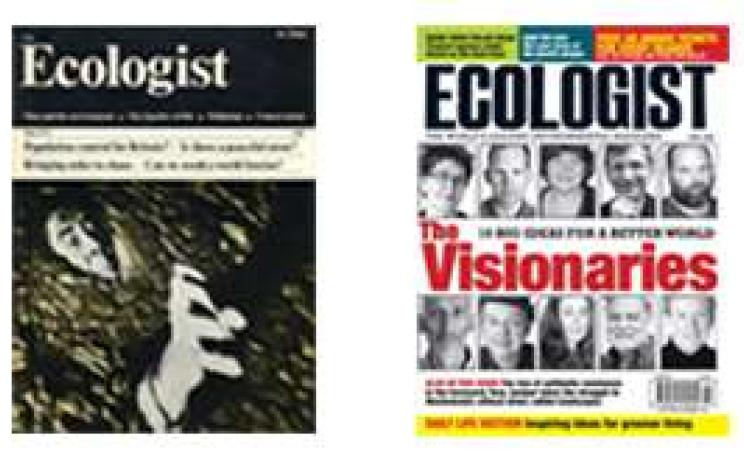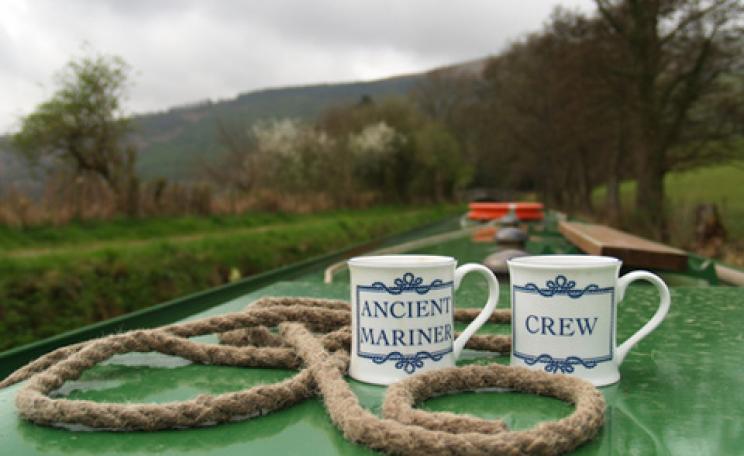We live in curious times. The leader of the Tory party and the boss of Tesco compete to out-green each other. The prime minister is berated for his polluting holidays. There are millions to be made investing in renewable technologies, and becoming a 'carbon coach' is a respectable career path. Environmentalism has officially arrived, and anyone who's anyone has a compost bin, a cycle helmet or a ludicrously-priced recycled jumper. If you're not on that new biogas-powered train, you'd better run before it leaves the station with all your friends on it, sipping fair-trade coffee and looking smugly down at you.
It might be hard for today's young, enthusiastic greenie to imagine a time when this was far from being the case. A time when being an environmentalist was the minority pursuit of a few hairy oddballs, who society looked upon with the deepest suspicion. A time when organic food was for radical outsiders, not supermarkets, and climate change was not a nice little earner for pinstriped carbon traders but a bonkers theory on a par with David Icke's universal lizard conspiracy. But there was such a time, and it was not so long ago.
Just about four decades ago, in fact. Being 'green' in those days meant that you were on your own. To talk about it, let alone to try to live it, was no guilt-relieving lifestyle choice. You had to be prepared to be ignored, laughed at or dismissed as a loony. You had to make a real effort, and some real sacrifices. Instead of following the crowd, you had to walk away from it.
Those who did so paved the way for what we have now. Like many prophets, they weren't recognised at the time. Some of them still aren't. The world has moved on, and much of what they did to lay the groundwork for the spread - finally - of green ideas and practices has been forgotten. Such is the fate of prophets. If they get it wrong, they are ignored. If they get it right - well, everyone says they agreed with them all along, and still they are ignored.
Cassandra
The green prophets of those days were no exception. There was Rachel Carson, author of the classic Silent Spring, which first warned of the dangers of pesticides and environmental chemicals. There was James Lovelock, the maverick scientist whose Gaia theory was sneered at for years by the peer-reviewed establishment, and who has only recently gained anything like mainstream acceptance. There was E. F. Schumacher, whose book Small Is Beautiful pioneered green economics.
And there was Edward Goldsmith. Now 79 years old and still ruffling feathers, 'Teddy', as he is almost universally known, was one of the most influential pioneers of the green movement, both in Britain and around the world. Determined, brave, inspiring, contradictory, stubborn, often right, sometimes wrong, frequently infuriating but always worth listening to, Teddy Goldsmith's life and career have closely paralleled that of the modern green movement, of which he was one of the founders. As his child finally grows up and flies the nest, his life and work are worth looking back on. Maybe it will even have some lessons for us.
'Of course', says Teddy now, 'nobody listened to us at all. People seemed to think we were quite shocking at the time. In the Seventies I lived a very ecological life in rural Cornwall. I had a compost toilet that cost me all my friends. If they didn't catch pneumonia because we had no central heating they were sick from the smell of it. I remember on one occasion we had this very charming, beautiful woman staying with us. It was the middle of winter, so she was already blue with cold. She needed to use the loo, so out she went. You should have seen her face when she came back. The next day she invented a transparent excuse about her mother being ill and left. Never saw her again. The look of relief on her face as she was leaving was spectacular.'
He pauses to relish the memory. 'Quite a lot of people thought I was mad,' he says.
Riches to rags...
Teddy Goldsmith came from a family of wealthy bankers. His father, Major Frank Goldsmith, had been a Tory MP and his brother James went on to become a controversial billionaire. Teddy himself went up to Oxford University in the Forties to study Politics, Philosophy and Economics. A mainstream, establishment career seemed to be beckoning. But it didn't work out that way.
'I realised while I was at Oxford that everything I was being taught was nonsense,' explains Teddy, with typical directness. 'It became quite clear that these people didn't know what they were talking about. Everything was compartmentalised. It was impossible to see the whole picture, or to get anyone else to do so. I found it all quite depressing, so I determined to find out why this was the case, and what the whole picture might be.'
Upon leaving university, family money gave him 'a certain leisure' to go searching for it. He spent several years reading things that interested him, seeking out his version of a coherent worldview.
'For a whole year, for example, I read about nothing but cybernetics,' says Teddy, with pride. 'But then anthropology grabbed me. It seemed to me that tribal societies had it right. The way they lived in a society with a social and ecological balance and stability seemed eminently sensible to me. After a while, I decided that reading about them was not enough, and that I wanted to see for myself.'
These days, views like this are commonplace. Back then, 'primitive' tribal people were not regarded as having any lessons to teach the rich world. Quite the opposite: they needed to be brought into its hallowed circle. Victorian attitudes still prevailed. They were backward, unenlightened, in need of help.
Teddy had other ideas, so he embarked on a world tour of tribal societies with his friend John Aspinall, the famously misanthropic naturalist. While Aspinall studied the wildlife of the region Teddy lived with the people, and learned lessons that he says have stuck with him ever since.
'I still have my notes from those days,' he says. 'I spent a lot of time in Africa, in tribal societies, and one thing I became convinced of was that these were the only truly 'sustainable' societies I had ever seen. That word is used a lot nowadays, but then it meant nothing. It seemed extremely important to me, and here were people putting it into practice. Yet their very existence was threatened by the remorseless expansion of industrial society.'
Beginnings
When he returned to Britain, Teddy became involved in a fledgling organisation known as the Primitive Peoples' Fund (PPF) - a name which demonstrates just how much things have changed in the intervening years. The PPF later became Survival International, but Teddy, by then, had moved on, along with his ideas.
'The more I thought and read and saw,' he says, 'the more it became clear to me how wide this problem was. Here were people talking about how these poor tribal people needed "development", and yet it was development that was destroying them. And it became clear to me that this applied to wider society as a whole.
'The whole concept of industrial development was responsible for the destruction of ecosystems the world over, and also for the destruction of human societies. It became clear to me that development was the problem, not the solution.'
Many things have changed in Teddy's lifetime, but this is one idea which remains taboo today. From left to right, radical to mainstream, Tony Blair to David Cameron, Bono to the Socialist Workers' Party, everyone agrees that 'development', the golden calf of our secular age, is A Good Thing.
Everyone, that is, except Teddy.
By the beginning of the 1970s, Teddy was confident enough in his ideas to try to get them more widely heard. Having discovered a handful of similarly inclined radicals he decided to start a magazine, to propound and explore these ideas. In July 1970 its first issue appeared. It was to be the first of many, and it is probably the most solid continuing testimony to Teddy's influence over the decades.
The Ecologist has changed hugely in its almost 40 years of existence, and will no doubt continue to do so. That first issue is already a historical document; very much of its time, testimony to how far both the green movement and the printing industry have travelled. Printed entirely in black and white, using traditional typesetting techniques, it is full of the eco-concerns of the time: air polluted by coal smoke; overpopulation; nuclear war; the survival or otherwise of hunter-gatherer societies. It contains adverts for Slimcea Bread ('available in both white and brown') and Natural Gas ('Britain's own clean fuel').
Start the presses
That first issue, and the hundreds that followed, crystallised Teddy's take on the world better than anything else. He remained its editor until 1990, and a glimpse through its back issues is a glimpse through the developing politics of the environmental movement. It is also a glimpse into how prescient Teddy and his editorial teams were.
Name any issue of current concern to the green movement - from deforestation to climate change; soil erosion to corporate farming; nuclear power to destructive dams; genetic engineering to the World Bank - and you can bet that Teddy and his ever-growing cabal got there first, and usually got it right. Not that things were always rosy.
'We thought that first issue would sell around 20,000 copies,' says Teddy. 'It sold about 3,000, so I couldn't afford to pay my fellow editor. So he left, and I was on my own.'
Things improved, though, and within two years, Teddy and the team decided to propound their ideas in a more substantial form. The ensuing book, A Blueprint For Survival, remains one of the most influential tracts in the history of the green movement. It sold half a million copies, influenced politicians, economists and many others, and helped finance Teddy's magazine for many years to come.
Teddy, meanwhile, and typically, was already moving on. The Blueprint had been so influential that it had led a group of young, keen environmentalists to float the idea of forming a political party; the first in the world to be based on green principles. That party - 'People' - was officially founded in 1973, with its founding document based closely on Teddy's Blueprint. Within a few years it had changed its name to the Ecology Party. These days, it's called the Green Party.
'We founded it a couple of months before a general election,' recalls Teddy, 'and they asked me to fight a seat.' Choosing his father's old constituency in Suffolk, he decided that he 'needed a gimmick' to get noticed. John Aspinall lent him a camel from his zoo, which he used to highlight the issue of soil erosion in East Anglia. He paraded through the streets with the camel on a lead, bearing the slogan, 'No deserts in Suffolk. Vote Goldsmith'. He lost his deposit in style.
Evolutions
Over the next 10 to 15 years Teddy wandered, literally and metaphorically, as the green movement matured around him. In India he worked for the Gandhi Peace Foundation, discovering in the process that 'Gandhi had got it completely right. Small, self-regulating societies, self-sufficient and self-respecting, are the most ecological there can be.'
He was employed by the Canadian Ministry of the Environment to review its Third World Aid programme. He set up the Committee on the Future of Nuclear Energy, which blew apart the economic case for nuclear power and shook the political establishment. With the then Ecologist editor Nick Hildyard he did the same to the case for large dams in the 1980s.
Meanwhile, he was at work on books of his own - The Great U-Turn, The Way and countless others - all of which hung on the one, central idea that had not changed in Teddy's thinking for 50 years: that small-scale, "traditional societies" are the only ones that work, and that humanity needs to return to such a way of life if it is to have a future.
Teddy's adherence to this notion has cost him friends and allies as the green movement has moved gradually away from it - and him - during his lifetime. A bit of historical context explains why. The early green movement had a wide variety of adherents and founders, from former communists to nationalists, and even a few notoriously far right sympathisers. The early greens aimed to be 'beyond left and right', to transcend not just contemporary political divisions, but industrial society itself.
Nature, they pointed out, is neither left nor right wing, and whether you sided with Adam Smith or Karl Marx on how to divide up the economic cake was beside the point if the cake itself was poisonous. The job of the greens was to question 'development' and economic growth, and create a new, wider political context.
Conservatives might focus on the nation state as a political unit, socialists might want to unite the workers of the world - but for the greens, the primary political unit was the planet itself, and its constituents were not just the humans who occupied it, but all its other forms of life too.
Time, and the realities of politics, have watered down this vision. Today's leading Greens are almost all drawn from the political left. They speak the language of 'social justice' and 'multiculturalism', and are anxious to trumpet their 'progressive' principles. In this context, Teddy Goldsmith's stubbornly small-c conservative vision, and his commitment to 'stability', 'tradition' and the teachings of ancient religions are red rags to a green bull.
From the horse's mouth
Also infuriating for others has been his insistence on talking to anyone who will listen to him, regardless of their politics. In 1997 this cost him his fellow Ecologist editors, who resigned after Teddy had addressed a group of far-right European politicians. They accused him of giving unnecessary succour to the far-right's attempts to co-opt green ideas. Teddy observed he had recently toured Switzerland at the invitation of a Trotskyist group without censure, but the damage had been done.
Perhaps he should take comfort from the impressive range of insults that have been thrown at him over the years. He has been called 'an extreme right-wing ideologue' (by Dutch Stalinist Eric Krebbers, who disliked Teddy so much that he invented the word 'fascistoid' especially for him), a 'Bolshevik' (French magazine l'Actuel), a 'wacko-communist-liberal' (viewer of the US C-Span TV network) a 'Jacobin terrorist' (US writer Lyndon Larouche), an 'enemy of the state' (President Suharto of Indonesia), a 'Gaian-sociobiologist' (Wolfgang Sachs), a 'madman' (Professor Lewis Wolpert) and even, allegedly at any rate, 'the anti-Christ' (the Catholic Archbishop of Bologna).
It's an impressive list, and anyone who accumulates such a wide range of venomous barbs can be sure of two things: firstly, they are having an impact; and secondly, their ideas are hard to fit into easy categories.
Teddy Goldsmith certainly isn't easy to pin down. He is full of loathing for industrial society, yet is determined to save it from itself. He believes it's too late to prevent climate change, yet has dedicated years to trying to do just that. Listening to him holding forth on the wonders of 'traditional societies', the importance of taboo, or the value of religion and you could take him for a died-in-the-wool Tory. But ask him his views on third world debt (cancel it all immediately), direct action (we need more of it), or global capitalism (foremost critic for four decades) and it's another story.
It would be hard to forge such an effective 40-year career without accumulating some contradictions, though. In the end, what matters is what Teddy Goldsmith has achieved. Perhaps history will be the judge of that. The man himself, when asked what his greatest achievement is, is strangely modest. He lists a few of his books, complains that they haven't sold enough copies, changes his mind and then, after a while, lands on a typically modest answer.
'I don't know what I have achieved', he says. 'I hope I've helped. If in some small way I've helped to slow the runaway juggernaut that we've created, or make people aware of it, that has to be a good thing. I hope I have done that.'
Paul Kingsnorth is a former deputy editor of the Ecologist.







